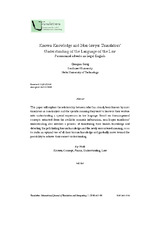Mostrar el registro sencillo del ítem
Known knowledge and non-lawyer translators’ understanding of the language of the law: pronominal adverbs in legal english
| dc.contributor.author | Geng, Qianqian | |
| dc.date.accessioned | 2019-04-09T09:37:29Z | |
| dc.date.available | 2019-04-09T09:37:29Z | |
| dc.date.issued | 2018 | |
| dc.identifier.issn | 2605-2954 | |
| dc.identifier.uri | http://hdl.handle.net/10396/18381 | |
| dc.description.abstract | This paper will explore the relationship between what has already been known by most translators as non-lawyers and the specific meaning they want to know in their venture into understanding a special expression in law language. Based on domain-general concepts extracted from the available semantic information, non-lawyer translators’ understanding also involves a process of transferring their known knowledge and detecting the path linking known knowledge and the newly encountered meaning, so as to make an optimal use of all their known knowledge and gradually move toward the possibility to achieve their correct understanding. | es_ES |
| dc.format.mimetype | application/pdf | es_ES |
| dc.language.iso | eng | es_ES |
| dc.publisher | UCOPress | es_ES |
| dc.rights | https://creativecommons.org/licenses/by/3.0/ | es_ES |
| dc.source | Transletters. International Journal of Translation and Interpreting 2, 63-88 (2018) | es_ES |
| dc.subject | Known | es_ES |
| dc.subject | Concept | es_ES |
| dc.subject | Frame | es_ES |
| dc.subject | Understanding | es_ES |
| dc.subject | Law | es_ES |
| dc.title | Known knowledge and non-lawyer translators’ understanding of the language of the law: pronominal adverbs in legal english | es_ES |
| dc.type | info:eu-repo/semantics/article | es_ES |
| dc.relation.publisherversion | https://www.uco.es/ucopress/ojs/index.php/tl/index | es_ES |
| dc.rights.accessRights | info:eu-repo/semantics/openAccess | es_ES |

